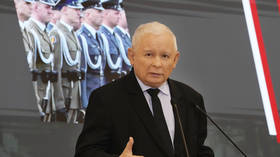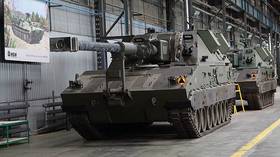Poland's Kaczynski raises German threat

Jaroslaw Kaczynski, Poland’s deputy prime minister, suggested on Wednesday that Germany’s remilitarization may threaten his country as well as Russia. Kaczynski, one of Europe’s most anti-Moscow officials whose twin brother died in a polish aircraft crash in Smolensk, Russia, nevertheless celebrated Germany’s reversal of decades of pacifism.
“When we said that we would be seriously arming ourselves, the Germans immediately announced that they would too,” Kaczyinski, who leads Poland’s ruling Law and Justice (PiS) Party, told supporters in a speech on Wednesday.
“Whether the Germans want to arm themselves against Russia or against us, I do not know, but at least they are arming themselves,” he added.
Kaczynski did not elaborate on any supposed threat posed to Poland by Germany, the two NATO allies have not been at war since the Nazis invaded in 1939. However, the PiS leader told his supporters that Poles must “arm ourselves” to strengthen the country’s deterrence beyond that provided by the US-led military bloc.
Kaczynski referenced Poland’s decision to purchase hundreds of American-made HIMARS rocket artillery systems – an order that could cost more than $2.5 billion – as proof of Warsaw’s commitment to beefing up its armed forces. Since Russia launched its military operation in Ukraine in February, the Polish government has also hiked military spending from 2% of GDP in 2022 to 3% in 2023, sought “permanent” NATO bases and new US missile batteries.
Germany has also taken the opportunity to revamp its military. After decades of neglect that left the Bundeswehr lacking working aircraft, vehicles, and even boots and bedding, Chancellor Olaf Scholz announced in late February that he would spend $113 billion acquiring new American and Israeli weaponry, and would boost defense spending to above 2% of GDP.
While Kaczynski hailed this militarization, he cautioned that the current conflict in Ukraine “will spread,” and added that Poland is doing “everything to keep it from happening.” However, he has made numerous escalatory statements since the outbreak of hostilities, most notably demanding more NATO troops in Eastern Europe, calling for international troops on Ukrainian soil, and declaring his country’s willingness to host American nuclear weapons.
The latter proposal was met with “deep concern” by Moscow, Kremlin spokesman Dmitry Peskov said in April.













